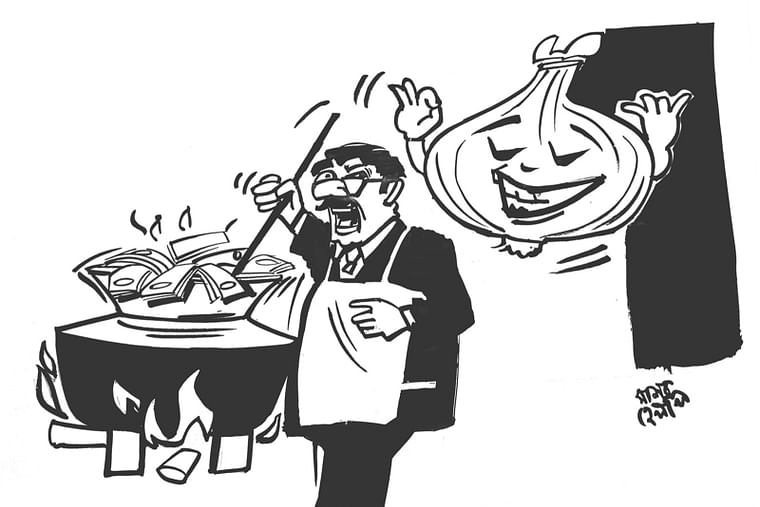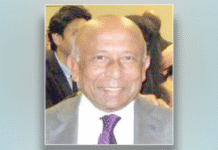
The taste of hilsa turns sour, remarked former president of the Delhi Press Club, Goutam Lahiri, about Bengalis’ favourite fish. He was reacting to India’s ban on onion export to Bangladesh.
Two reports had hit the headlines that day. On one hand Bangladesh had not only lifted its ban on hilsa export to India, but had increased the volume of export on the occasion of Durga Puja. The first consignment of the fish reached Kolkata on Tuesday. On the other hand, India announced a ban on onion export to Bangladesh. Hence Lahiri’s remark.
Bangladesh asked India to reconsider its ban on onion export. Bangladesh’s high commissioner in Delhi, Mohammad Imran, conveyed Bangladesh’s concern to officials of the foreign ministry there. In Dhaka, foreign minister AK Abdul Momen said that the Indian foreign ministry is repentant about the sudden ban. But India has not made any official statement.
Prothom Alo’s Delhi correspondent Saumya Bandyopadhyay said that the decision to halt onion export was a political one. The price of onions had gone up in the domestic market. Bihar’s Vidhan Sabha (State Legislative Assembly) elections are around the corner. The BJP government doesn’t want to give the opposition a chance to use the price of onions as an issue to win votes. That is why the government stopped the export of onions. The farmers, though, are in favour of exports. A similar situation arose last year. India at the time first increased export duty and then later banned export.
The price of onions in Bangladesh last year shot up to Tk 300 per kg. It is now Tk 100. Commerce minister Tipu Munshi said there is plenty of onions in stock and imports are coming in from many other countries. But the consumers are having to pay the price. A section of businessmen are always waiting to seize such opportunities.
India’s foreign secretary Shringla came to Bangladesh and termed relations between the two countries as exceptional and incomparable. Surely this abrupt ban on onion export does not reflect incomparable relations
Bangladesh grows 2 million to 2.2 million tonnes of onions annually and still has to import around 600,000 to 700,000 tonnes, 90 per cent of which comes from India. In other words, Bangladesh is dependent on India for onion import.
The primary and secondary education ministry took up a programme to send 500 officials abroad for training on midday meals of khichuri (a lentils and rice dish) for primary school children. This training would entail an expenditure of Tk 50 million. The issue went viral of the social media
In September last year after India had banned exporting onions to Bangladesh, prime minister Sheikh Hasina went to New Delhi to attend an international conference there. She expressed her annoyance at India’s sudden decision to halt onion export and said, “If exports must be halted, inform us in advance. Then we can make alternative arrangements to meet our demand.” India’s commerce minister was present at that meeting.
This time too, India halted onion export in the same manner. Around a month ago India’s foreign secretary Shringla came to Bangladesh and termed relations between the two countries as exceptional and incomparable. Surely this abrupt ban on onion export does not reflect incomparable relations.
The state minister for primary and mass education, Md Zakir Hossain, on Wednesday called a press conference and lashed out at the media. He said that BNP-Jamaat people had joined the media and were tarnishing the government’s image.
Justifying the plan to send officials abroad on training, he said this decision was taken to improve the primary school lunch programme and have the officials trained in cooking and serving khichuri. He said there was no cause to make such a fuss over the issue. He said that he himself had been to Kerala to observe the management of providing cooked meals to the school children there.
The government’s image is not tarnished if the media reveals irregularities or corruption of any agency or programme. The government’s image is tarnished by those in the administration who create scandals in the purchase of pillows, curtains and books and in the cooking of khichuri
I humbly ask the state minister, is there no one in the country to provide training on how to cook and manage khichuri meals? While will anyone have to be sent abroad for this? During cyclones when thousands of people lose their homes and take refuge in the cyclone shelters, they are fed khichuri. No one was sent abroad for training in this regard. Why do they need to be sent now? Do the people of Bangladesh not know how serve meals to schoolchildren?
The local people play a major role in areas where midday meals are served in the afternoon to primary school students. There are examples of this in Bangladesh too. Describing his experience, the head of an NGO said that they gave the mothers of the students the responsibility to prepare the khichuri and the children happily ate the meals. The problem is that the government has left the matter of running the school completely in the hands of the bureaucrats. The local people are not being given any role to play. The management committees of the schools comprise ruling party bigwigs. The people who are actually committed to education stay away in fear of these people.
A Japanese development workers was interviewed on a TV channel on the same say that the state minister held the press conference. He said he had approached government functionaries in this regard 10 years ago but had received no response.
The state minister admitted that huge funds had been misappropriated before this in the purchase of school books initiated by the primary and mass education. He said, “I do not know anything about the book selection. My committee gave a list of 30 to 35 books. Eight books were purchased, bypassing me. Even the tenders were floated without my knowledge. As soon as I discovered this scam, I called for an inquiry.”
It is not known what the inquiry has done so far. The ministry is also silent about the court order to form a three-member inquiry committee. One of the members of the committee said no one from the ministry had contacted him as yet. Apparently the ministry is ignoring the court’s directives, too.
How is the government’s image tarnished? The government’s image is not tarnished if the media reveals irregularities or corruption of any agency or programme. The government’s image is tarnished by those in the administration who create scandals in the purchase of pillows, curtains and books and in the cooking of khichuri.
* Sohrab Hassan is joint editor of Prothom Alo and a poet. He can be contacted at sohrabhassan55@gmail.com. This article, appearing in the print and online editions of Prothom Alo, has been rewritten for the English edition by Ayesha Kabir









